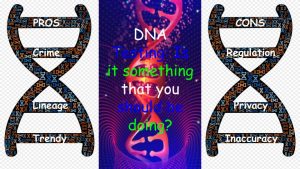DNA testing can be inaccurate and encourages secret surveillance
November 6, 2019
DNA testing, as cool and trendy as it may be, simply isn’t regulated enough to be well worth the risk. Having the right to privacy is fundamental, and protecting it is much more important than wasting money and time to risk the leak of your information without consent. As we venture further into an age where information has become increasingly private, how much is too much to know?
DNA does show one’s cultural lineage through generations. This result of DNA testing is interesting enough, but doesn’t apply the same interest to everyone. My sister Lillian Hart, who was adopted from China when she was only one year old, has accepted my parents and I as her complete family, and doesn’t have any interest in the history of her birth parent’s lineage.
How worth it is submitting your DNA to these online companies? FamilyTreeDNA, which is one of the most popular at-home DNA testing businesses, admitted in early 2019 to sharing genetic information with the FBI. They made their files of more than 2 million DNA samples available more than a year ago for the FBI to carefully comb over and observe to solve unsolved murder and rape cases.
This is familiar across multiple sites, which is a dangerous privacy threat. Websites 23AndMe and Ancestry.com also were subject to releasing information to the FBI in the case of the Golden State Killer. In an article written by Aja Romano for Vox, local and national officials, “Searched family trees generated through the public profiles, looking for plausible leads.” Thousands of innocent DNA samplers who just wanted to submit their information for plausible innocent reasons had their private data studied and analyzed by law enforcement without clear regulation.
These businesses have not been transparent with their users about the potential use of their DNA. DNA testing companies like FamilyTreeDNA, who have worked with the FBI, did not explicitly tell their users in their terms and conditions that this was possible. In an interview with the New York Times, New York University Professor Erin Murphy said, “Even if you were reading all of your spam email about all the privacy changes, did you get one that says you have agreed to be the F.B.I.’s testing lab? No, they did not issue that.”
If your information is potentially available to be given up to the government without your consent to see, why risk making it accessible in the first place? Zeller believes that DNA should be treated as sensitive information. “Specific genetic information such as that provided by DNA testing should be kept as private as all of our health information—only shared with a patient’s consent.”
Even though DNA testing can provide some benefits as to learning about genetic health information, the results are not always as concrete as they seem. National Institute of Health scientist Eileen Zeller said, “While test results can tell you if you possess a DNA variant that is associated with a higher risk (of a disease), it doesn’t mean you will ultimately succumb to a particular disease or condition—so the test result is not a definitive diagnosis.”
It is baffling to me why more DNA testing laws aren’t in place like other medical health privacy laws between doctors and patients. In medicine, The Privacy Rule, which is a federal law, says that your health information is under your rights of protection, and only a limited number of people can see it. In comparison, DNA information, once given to websites, can be freely examined by a countless number of people. There must be regulation in this business before customers can knowingly trust the employees who handle this sensitive information.
What do you think? Should you test your DNA, or should you avoid it? Comment below your thoughts, and mention us on twitter @LHSJournalism!










